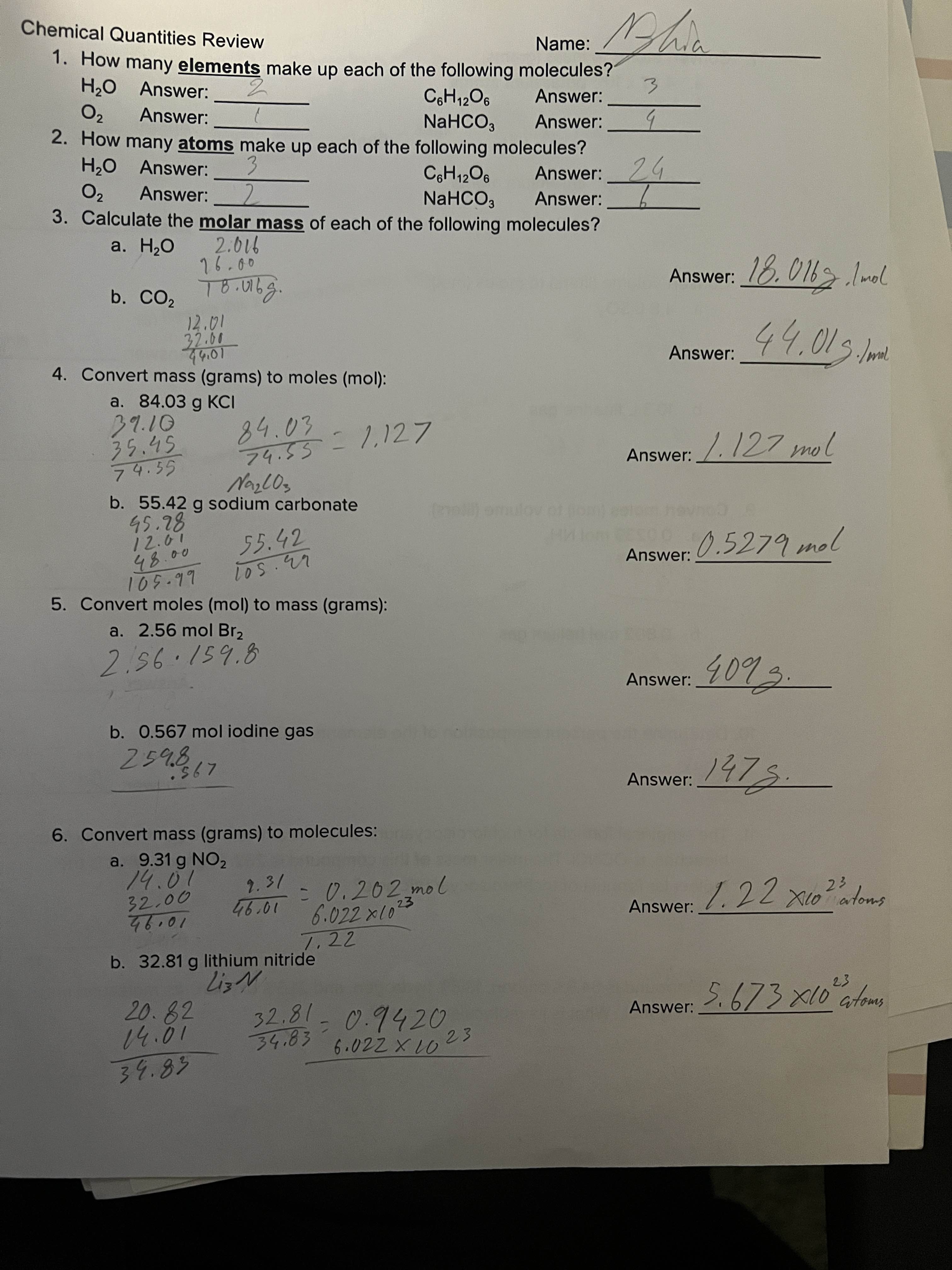How many elements make up each of the following molecules? H2O, O2, C6H12O6, NaHCO3. How many atoms make up each of the following molecules? H2O, O2, C6H12O6, NaHCO3. Calculate the... How many elements make up each of the following molecules? H2O, O2, C6H12O6, NaHCO3. How many atoms make up each of the following molecules? H2O, O2, C6H12O6, NaHCO3. Calculate the molar mass of each of the following molecules: H2O, CO2. Convert mass (grams) to moles (mol) for KCl and sodium carbonate. Convert mass (grams) to moles (grams) for Br2 and iodine gas. Convert mass (grams) to molecules for NO2 and lithium nitride.

Understand the Problem
The question involves multiple calculations related to chemical quantities, including determining the number of elements and atoms in molecules, calculating molar mass, and converting between grams and moles of different substances.
Answer
- Elements in $H_2O$: 2; $O_2$: 1; $C_6H_{12}O_6$: 3; $NaHCO_3$: 4. - Atoms in $H_2O$: 3; $O_2$: 2; $C_6H_{12}O_6$: 24; $NaHCO_3$: 6. - Molar mass $H_2O$: 18.016 g/mol; $CO_2$: 44.01 g/mol. - Moles: $KCl$: 1.127 mol; Sodium carbonate: 0.523 mol. - Mass: $Br$: 409.0 g; Iodine gas: 147.0 g. - Molecules: $NO_2$: $1.22 \times 10^{23}$; $Li_3N$: $5.67 \times 10^{23}$ atoms.
Answer for screen readers
-
Number of elements in:
- $H_2O$: 2
- $O_2$: 1
- $C_6H_{12}O_6$: 3
- $NaHCO_3$: 4
-
Number of atoms in:
- $H_2O$: 3
- $O_2$: 2
- $C_6H_{12}O_6$: 24
- $NaHCO_3$: 6
-
Molar mass of:
- $H_2O$: $18.016 , \text{g/mol}$
- $CO_2$: $44.01 , \text{g/mol}$
-
Moles calculated:
- $KCl$: $1.127 , \text{mol}$
- Sodium carbonate: $0.523 , \text{mol}$
-
Mass calculated:
- $Br$: $409.0 , \text{g}$
- Iodine gas: $147.0 , \text{g}$
-
Molecules calculated:
- $NO_2$: $1.22 \times 10^{23}$
- $Li_3N$: $5.67 \times 10^{23}$
Steps to Solve
-
Identify Elements in Molecules
To find the number of elements in each molecule, count the unique types of atoms present:
- For $H_2O$: 2 elements (Hydrogen and Oxygen)
- For $O_2$: 1 element (Oxygen)
- For $C_6H_{12}O_6$: 3 elements (Carbon, Hydrogen, Oxygen)
- For $NaHCO_3$: 4 elements (Sodium, Hydrogen, Carbon, Oxygen)
-
Identify Atoms in Molecules
Count the total number of atoms in each molecule:
- For $H_2O$: 3 atoms (2 H + 1 O)
- For $O_2$: 2 atoms (2 O)
- For $C_6H_{12}O_6$: 24 atoms (6 C + 12 H + 6 O)
- For $NaHCO_3$: 6 atoms (1 Na + 1 H + 1 C + 3 O)
-
Calculate Molar Mass
Use the atomic masses from the periodic table to calculate the molar mass for each molecule:
- For $H_2O$: [ \text{Molar mass} = (2 \times 1.008) + (1 \times 16.00) = 18.016 , \text{g/mol} ]
- For $CO_2$: [ \text{Molar mass} = (1 \times 12.01) + (2 \times 16.00) = 44.01 , \text{g/mol} ]
-
Convert Mass to Moles
For the following examples, use the formula: [ \text{Moles} = \frac{\text{mass (g)}}{\text{molar mass (g/mol)}} ]
- For 84.03 g KCl: [ \text{Moles} = \frac{84.03}{74.55} \approx 1.127 , \text{mol} ]
- For 55.42 g sodium carbonate ($Na_2CO_3$): [ \text{Molar mass of } Na_2CO_3 = (2 \times 22.99) + (1 \times 12.01) + (3 \times 16.00) = 105.99 , \text{g/mol} ] [ \text{Moles} = \frac{55.42}{105.99} \approx 0.523 , \text{mol} ]
-
Convert Moles to Grams
Use the formula: [ \text{Mass (g)} = \text{moles} \times \text{molar mass (g/mol)} ]
- For 2.56 mol Br: [ \text{Mass} = 2.56 \times 159.8 \approx 409.0 , \text{g} ]
- For 0.567 mol iodine gas ($I_2$): [ \text{Molar mass of } I_2 = 2 \times 126.90 = 253.80 , \text{g/mol} ] [ \text{Mass} = 0.567 \times 253.80 \approx 147.0 , \text{g} ]
-
Convert Mass to Molecules
To find number of molecules: [ \text{Number of molecules} = \text{moles} \times 6.022 \times 10^{23} ]
- For 9.31 g $NO_2$: [ \text{Moles} = \frac{9.31}{46.01} \approx 0.202 , \text{mol} ] [ \text{Molecules} = 0.202 \times 6.022 \times 10^{23} \approx 1.22 \times 10^{23} , \text{molecules} ]
- For 32.81 g lithium nitride ($Li_3N$): [ \text{Molar mass of } Li_3N = (3 \times 6.94) + (1 \times 14.01) = 34.83 , \text{g/mol} ] [ \text{Moles} = \frac{32.81}{34.83} \approx 0.942 , \text{mol} ] [ \text{Molecules} = 0.942 \times 6.022 \times 10^{23} \approx 5.67 \times 10^{23} , \text{atoms} ]
-
Number of elements in:
- $H_2O$: 2
- $O_2$: 1
- $C_6H_{12}O_6$: 3
- $NaHCO_3$: 4
-
Number of atoms in:
- $H_2O$: 3
- $O_2$: 2
- $C_6H_{12}O_6$: 24
- $NaHCO_3$: 6
-
Molar mass of:
- $H_2O$: $18.016 , \text{g/mol}$
- $CO_2$: $44.01 , \text{g/mol}$
-
Moles calculated:
- $KCl$: $1.127 , \text{mol}$
- Sodium carbonate: $0.523 , \text{mol}$
-
Mass calculated:
- $Br$: $409.0 , \text{g}$
- Iodine gas: $147.0 , \text{g}$
-
Molecules calculated:
- $NO_2$: $1.22 \times 10^{23}$
- $Li_3N$: $5.67 \times 10^{23}$
More Information
These calculations involve fundamental concepts in chemistry, specifically relating to the states of matter, molecular composition, and conversions between grams, moles, and molecules. Understanding these principles is crucial for applications in chemistry, such as stoichiometry and reactions.
Tips
- Confusing elements with atoms: Always differentiate between unique elements and the total count of atoms.
- Incorrectly calculating molar mass by not accounting for all constituents in a molecule.
- Forgetting to use correct units when converting mass to moles or moles to grams.
AI-generated content may contain errors. Please verify critical information